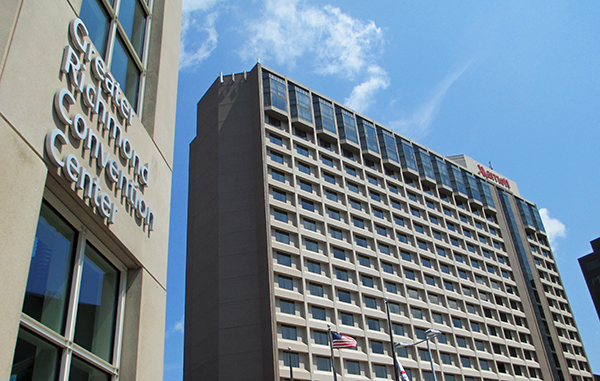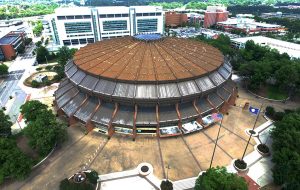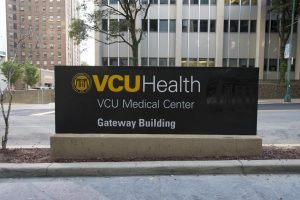Friday update: In his briefing today, Gov. Ralph Northam announced the Greater Richmond Convention Center as one of three facilities identified thus far that will serve as field hospitals as part of the state’s coronavirus response.
Northam said the 700,000-square-foot facility in downtown Richmond can accommodate 432 acute care beds or 758 non-acute beds. The other sites include the Hampton Roads Convention Center and the Dulles Expo Center, the latter a change from an Exxon Mobil facility previously considered for Northern Virginia.
Next steps are to complete contracts, design and then construction of the facilities, Northam said. He said teams are moving fast and expect the sites will be ready in six weeks, around the time that cases in Virginia are projected to surge.
Northam emphasized that the sites are not to be used to treat COVID-19 patients but rather to free up existing hospital space for virus treatment there.
(The original story appears below)
With the spread of coronavirus forecast to surge in Virginia in the next two months, facilities across the state are being assessed for potential use as temporary hospitals, with several options apparent in the Richmond region.
Hotels, arenas and open spaces are among the types of sites that the U.S. Army Corps of Engineers is assessing the suitability of for potential healthcare use as part of the national response to the COVID-19 pandemic, according to USACE’s Norfolk District office, which covers the Richmond region.
In his response briefing Wednesday, Gov. Ralph Northam said USACE and state officials had identified 41 sites across Virginia that could serve as field hospitals, including the Hampton Roads Convention Center, an Exxon Mobil facility in Fairfax and an unspecified site in the Richmond area. More details on sites were to be announced in subsequent briefings this week.
While no specific locations for such alternate care sites, as they are called, have been announced for Richmond as of yet, the region presents several possible contenders.
As far as arenas go, there’s the Richmond Coliseum, though that facility likely is not an option. The 50,000-square-foot, nearly 50-year-old arena has been shuttered for over a year while city officials weighed what to do with it, citing safety concerns and annual costs to maintain it.
Another candidate could be the Greater Richmond Convention Center, which is likewise within blocks of VCU Health’s downtown complex. The 700,000-square-foot facility is twice the size of Hampton Roads’, and larger convention centers have been put to use in harder-hit states such as New York and Louisiana.
While Virginia’s coronavirus numbers are so far nowhere near those states’, Northam said Wednesday that available forecasts show a surge in cases in Virginia in late April or May.
As of Tuesday, GRCC was not planned for such use, General Manager Michael Meyers said.
“We are currently not actively involved in any discussions to use the Greater Richmond Convention Center or any portion of it as a medical facility,” Meyers said in an email.
While open-space options also are considered, hotels are emerging as plausible contenders, particularly in light of the pandemic’s impacts on the hospitality and tourism industries amid travel restrictions and stay-at-home directives. Several downtown hotels have shut their doors and stand empty, while others are said to be operating with skeleton crews.
Neil Amin, CEO of Shamin Hotels, the region’s largest hotel operator, said his company had not been approached as of Wednesday, but that it would be open to the idea if the need arises.
“Whatever we can do to help the community,” said Amin, whose company made headlines two years ago when it housed residents of one of Richmond’s public housing complexes in one of its hotels when the complex was without heat.
Preparations underway
Julian Walker, a spokesman for the Virginia Hospital & Healthcare Association, wouldn’t discuss specifics in terms of sites or criteria, but said its members “have been actively involved in the planning and prep to respond to coronavirus.”
Walker noted existing programs such as the Virginia Healthcare Emergency Management Program that has been in place since 9/11 to respond to public health and healthcare emergencies, including infectious disease outbreaks. He noted a recent annual ranking by the national Trust for America’s Health put Virginia in the highest tier of states in terms of readiness to respond to a public health threat.
“What Virginians can take some comfort in knowing is that the infrastructure to be ready to respond to this situation” is there, Walker said. “It’s not something that has to be built from the ground up specifically for this coronavirus.”
Noting that not all COVID-19 patients will require hospital care, Walker said there are about 18,500 licensed hospital beds in Virginia, 2,000 of which are intensive-care-unit beds. With the caveat that circumstances are different by hospital and by community, Walker said, “At this point, the healthcare system, there is still capacity to treat patients in hospitals and health systems across the commonwealth.
“Even with that said, hospitals are taking a number of steps to be ready for the potential for a surge in in-patient treatment demand,” he said, noting recent measures such as postponements of elective procedures to help increase bed space.
Some hospitals also are preparing their own alternate care sites to help free up capacity, Walker said, noting VCU Health as a local example. The university has been converting student housing in its Honors College building, a former hospital, for non-COVID-19 patients should a surge exceed capacity at its VCU Medical Center campus downtown.
As such efforts are underway, other industries that do business with hotels are getting in on the hospital-conversion conversation.
Richmond architecture firm Baskervill, whose client base is heavy in the hospitality industry, recently posted resources on its website for hospitality clients that might be interested in providing their facilities for temporary hospitals, increasing bed capacity while also potentially making up lost revenue.
“A lot of our hotel clients are trying to figure out, ‘Is there an alternate revenue stream I can develop with my empty or shuttered hotel?’ said Bob Clark, Baskervill’s president. “We went through and did the quick analysis to say here’s what the best practice is, here’s the best use for a limited-service hotel in this environment.”
Stressing that such facilities would be used to relieve hospitals but not serve as ICUs for treating COVID-19 patients, Clark said the concept is being pursued by some of the firm’s clients across the country.
“The U.S. Army Corps of Engineers is really pushing on some of this now, which is interesting. A couple of our clients across the country with hotels have had inquiries from local officials, so they’re using this,” Clark said.
“It’s all locality-based and what the local needs are and capacities,” he said. “It’s out there, it’s getting traction.”
Meanwhile, USACE’s Norfolk District office is soliciting capability briefings from contractors interested in working on alternate care sites in Virginia, should they be needed. Interested firms are asked to review materials posted on the office’s website and submit briefings, the process for which is detailed here.
Additional reporting by BizSense editor Michael Schwartz.
Friday update: In his briefing today, Gov. Ralph Northam announced the Greater Richmond Convention Center as one of three facilities identified thus far that will serve as field hospitals as part of the state’s coronavirus response.
Northam said the 700,000-square-foot facility in downtown Richmond can accommodate 432 acute care beds or 758 non-acute beds. The other sites include the Hampton Roads Convention Center and the Dulles Expo Center, the latter a change from an Exxon Mobil facility previously considered for Northern Virginia.
Next steps are to complete contracts, design and then construction of the facilities, Northam said. He said teams are moving fast and expect the sites will be ready in six weeks, around the time that cases in Virginia are projected to surge.
Northam emphasized that the sites are not to be used to treat COVID-19 patients but rather to free up existing hospital space for virus treatment there.
(The original story appears below)
With the spread of coronavirus forecast to surge in Virginia in the next two months, facilities across the state are being assessed for potential use as temporary hospitals, with several options apparent in the Richmond region.
Hotels, arenas and open spaces are among the types of sites that the U.S. Army Corps of Engineers is assessing the suitability of for potential healthcare use as part of the national response to the COVID-19 pandemic, according to USACE’s Norfolk District office, which covers the Richmond region.
In his response briefing Wednesday, Gov. Ralph Northam said USACE and state officials had identified 41 sites across Virginia that could serve as field hospitals, including the Hampton Roads Convention Center, an Exxon Mobil facility in Fairfax and an unspecified site in the Richmond area. More details on sites were to be announced in subsequent briefings this week.
While no specific locations for such alternate care sites, as they are called, have been announced for Richmond as of yet, the region presents several possible contenders.
As far as arenas go, there’s the Richmond Coliseum, though that facility likely is not an option. The 50,000-square-foot, nearly 50-year-old arena has been shuttered for over a year while city officials weighed what to do with it, citing safety concerns and annual costs to maintain it.
Another candidate could be the Greater Richmond Convention Center, which is likewise within blocks of VCU Health’s downtown complex. The 700,000-square-foot facility is twice the size of Hampton Roads’, and larger convention centers have been put to use in harder-hit states such as New York and Louisiana.
While Virginia’s coronavirus numbers are so far nowhere near those states’, Northam said Wednesday that available forecasts show a surge in cases in Virginia in late April or May.
As of Tuesday, GRCC was not planned for such use, General Manager Michael Meyers said.
“We are currently not actively involved in any discussions to use the Greater Richmond Convention Center or any portion of it as a medical facility,” Meyers said in an email.
While open-space options also are considered, hotels are emerging as plausible contenders, particularly in light of the pandemic’s impacts on the hospitality and tourism industries amid travel restrictions and stay-at-home directives. Several downtown hotels have shut their doors and stand empty, while others are said to be operating with skeleton crews.
Neil Amin, CEO of Shamin Hotels, the region’s largest hotel operator, said his company had not been approached as of Wednesday, but that it would be open to the idea if the need arises.
“Whatever we can do to help the community,” said Amin, whose company made headlines two years ago when it housed residents of one of Richmond’s public housing complexes in one of its hotels when the complex was without heat.
Preparations underway
Julian Walker, a spokesman for the Virginia Hospital & Healthcare Association, wouldn’t discuss specifics in terms of sites or criteria, but said its members “have been actively involved in the planning and prep to respond to coronavirus.”
Walker noted existing programs such as the Virginia Healthcare Emergency Management Program that has been in place since 9/11 to respond to public health and healthcare emergencies, including infectious disease outbreaks. He noted a recent annual ranking by the national Trust for America’s Health put Virginia in the highest tier of states in terms of readiness to respond to a public health threat.
“What Virginians can take some comfort in knowing is that the infrastructure to be ready to respond to this situation” is there, Walker said. “It’s not something that has to be built from the ground up specifically for this coronavirus.”
Noting that not all COVID-19 patients will require hospital care, Walker said there are about 18,500 licensed hospital beds in Virginia, 2,000 of which are intensive-care-unit beds. With the caveat that circumstances are different by hospital and by community, Walker said, “At this point, the healthcare system, there is still capacity to treat patients in hospitals and health systems across the commonwealth.
“Even with that said, hospitals are taking a number of steps to be ready for the potential for a surge in in-patient treatment demand,” he said, noting recent measures such as postponements of elective procedures to help increase bed space.
Some hospitals also are preparing their own alternate care sites to help free up capacity, Walker said, noting VCU Health as a local example. The university has been converting student housing in its Honors College building, a former hospital, for non-COVID-19 patients should a surge exceed capacity at its VCU Medical Center campus downtown.
As such efforts are underway, other industries that do business with hotels are getting in on the hospital-conversion conversation.
Richmond architecture firm Baskervill, whose client base is heavy in the hospitality industry, recently posted resources on its website for hospitality clients that might be interested in providing their facilities for temporary hospitals, increasing bed capacity while also potentially making up lost revenue.
“A lot of our hotel clients are trying to figure out, ‘Is there an alternate revenue stream I can develop with my empty or shuttered hotel?’ said Bob Clark, Baskervill’s president. “We went through and did the quick analysis to say here’s what the best practice is, here’s the best use for a limited-service hotel in this environment.”
Stressing that such facilities would be used to relieve hospitals but not serve as ICUs for treating COVID-19 patients, Clark said the concept is being pursued by some of the firm’s clients across the country.
“The U.S. Army Corps of Engineers is really pushing on some of this now, which is interesting. A couple of our clients across the country with hotels have had inquiries from local officials, so they’re using this,” Clark said.
“It’s all locality-based and what the local needs are and capacities,” he said. “It’s out there, it’s getting traction.”
Meanwhile, USACE’s Norfolk District office is soliciting capability briefings from contractors interested in working on alternate care sites in Virginia, should they be needed. Interested firms are asked to review materials posted on the office’s website and submit briefings, the process for which is detailed here.
Additional reporting by BizSense editor Michael Schwartz.







The other thing they will need to consider is the remediation after the use of a hotel as a hospital, especially for something as contagious as this.
You could close a facility to all access for 30 days and the virus would not survive. Then after 30 days have the place cleaned/disinfected as an extra precaution.